Horse herbs: Spring edition
The Natural Way - specialized in itching and skin complaints and the natural treatment of horses with sweet itch, mud fever and CPL.
Offer herbs as a variation in the diet or as a healthy snack... It is hip, but has actually been the staple food of horses for thousands of years. If this plant knowledge is used wisely, you can spoil your horse with a tasty enrichment to his or her ration. Based on her many years of passion as a herbalist, Laura Cleirens from The Natural Way provides an overview of plants that you can pick and feed to your horse in the spring - safely and in moderation.
In this article we take a closer look at the plants that you can pick for your horse from spring to summer , their effect and application and additional tips.

Together with her horses and a bouquet of cow parsley © Laura Cleirens
Contents
- How many herbs can a horse eat daily?
- Overview of safe and edible plants for horses - spring
- Stinging nettle (Urtica dioica)
- White dead-nettle (Lamium album)
- Purple deadnettle (Lamium purpureum)
- Yarrow (Achillea millefolium)
- Chickweed (Stellaria media)
- Hawthorn (Crataegus)
- Dandelion (Taraxacum officinale)
- Cleaver (Galium aparine)
- Cow parsley (Anthriscus sylvestris)
- Shepherd's purse (Capsella bursa pastoris)
- Daisy (Bellis perennis)
- Narrow plantain (Plantago lanceolata)
- Great plantain (Plantago major)
- White clover (Trifolium repens)
- Red clover (Trifolium pratens)
- Tangle hornflower (Cerastium glomeratum)
- Robert's wort (Geranium robertianum)
- Real chamomile (Matricaria chamomilla)
- Speedwell (Veronica)
- Thistle (Carduus)
- Final word
How many herbs can a horse eat daily?
All the herbs in this article are safe and suitable for feeding your horse as a variation, both to support complaints and to keep your horse in good health. Select a few herbs, pick them fresh in a clean environment and feed 1 handful per day (50-100g), dry them in the winter months or buy them dried and stick to the recommended amount stated on the packaging.
Overview of safe and edible plants for horses - spring
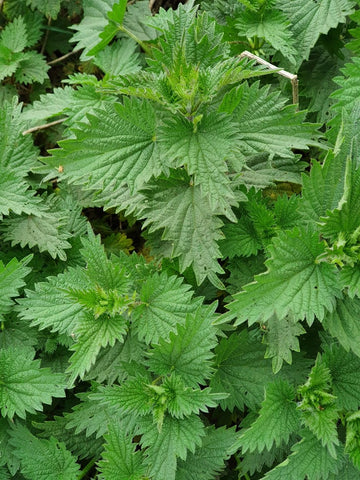
Stinging nettle (Urtica dioica)
Nettle is a fantastic but underrated plant for use in horses. You can cut these off at the edge of your pasture and let them dry on the pasture for a few hours. As soon as the injection is removed, your horse will eat it automatically. An ideal and healthy snack for a change! You can also dry these so that you have a winter supply.
This plant has a blood and lymph purifying, deacidifying and detoxifying effect. It boosts your horse's immunity/resistance, so be sure to pick the fresh buds in the spring.
Nettles are an ideal addition to the ration if your horse suffers from sweet itch, mud fever and other complaints. They are good for the skin, urinary tract, digestion, allergies, rheumatic and joint complaints and support general well-being.
Nettles are a source of vitamins: A, B, C, D, E and K, tannins, formic acid, flavanoids, minerals: calcium, potassium, sodium, iron, silicon and bitter substances, histamine, acetylcholine and more.
Note: some horses may react sensitively to nettles.
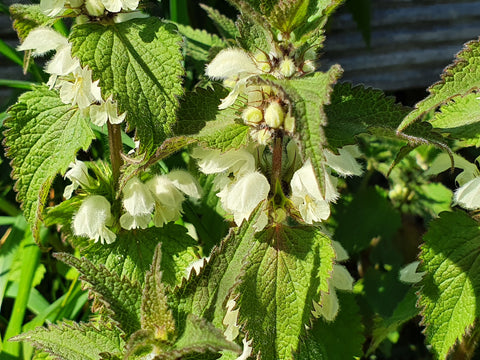
White dead-nettle (Lamium album)
This plant, which comes in white, purple and yellow, has a blood purifying and strengthening effect. They are a healthy snack for horses suffering from respiratory problems, such as bronchitis and inflammation, because they have an anti-inflammatory and soothing effect on the mucous membranes. This plant has a positive effect on the skin: ideal for horses that suffer from sweet itch, mud fever, CPL, etc.
Thanks to the histamine that White dead-nettle contains, an allergic reaction can occur, but that is precisely why this plant is also used as preventive support for allergies.
Contains mucilages, bitter substances, tannins, vitamins B, C, histamine, potassium, etc.
Tip: Have you stung yourself on nettles? Then rub white dead-nettle through your hands and on the sensitive area, as this will extinguish the sting!

Purple dead-nettle (Lamium purpureum)
See White dead-nettle.

Yarrow (Achillea millefolium)
Yarrow is an herb with an immunity-strengthening and blood-purifying effect and it has a positive effect on digestion and stomach function.
Yarrow contains essential oils, vitamins B1 and B2, flavonoids, tannins, alkaloids, phenolic acids, calcium, sodium, potassium, phosphorus and more.
You can offer yarrow fresh or dried.
NOTE: Do not use during pregnancy!

Chickweed (Stellaria media)
Chickweed can be found in nature almost all year round, so if you are lucky, also on or around your pasture.
Chickweed has an anti-inflammatory and strengthening effect, soothes itching and has a diuretic effect. It supports immunity and works against inflammation. Ideal for horses that suffer from sweet itch, mud fever, CPL, etc.
Pick throughout the year and offer fresh.
Contains vitamin C, saponins, silicon, potassium, magnesium and more.

Hawthorn (Crataegus)
Hawthorn blooms with fragrant white flowers in May and June. This shrub can grow up to 10 meters high and was previously used as a fence. Hawthorn contains sharp needles, but the young shoots can be safely eaten.
Hawthorn is a source of vitamin C and antioxidants. It is used for stress and tension and to support heart complaints, blood pressure regulation and blood sugar levels. The flowers, leaves and berries can be used for this.
NOTE: Always give hawthorn in moderation!

Dandelion (Taraxacum officinale)
Dandelion, also known as "piss flower", is used in a cleansing treatment in the spring, which you can read all about in our article ' Detox for horses '.
Dandelion stimulates the liver and has a diuretic effect. It lowers blood sugar levels and also increases resistance, which will benefit horses with sweet itch and/or other complaints.
In the spring you can pick the flowers and feed them fresh leaves. In the autumn you can dig out the root, where all the forces are stored.
Contains bitter substances, vitamin B1, B2, B3, C and beta-carotene, flavonoids, calcium, manganesium and more.

Cleaver (Galium aparine)
Cleaver is the perfect support for horses that suffer from sweet itch, mud fever and chronic progressive lymphedema (CPL).
This herb not only sticks to your clothing or animal fur, it also removes waste products from your horse's body. In addition, it helps with inflammation, tissue repair and itching and has a blood purifying effect.
You can give cleavers fresh to your horse.
Contains flavonoids, coumarin, organic acids, bitter iridoids and more.

Cow parsley (Anthriscus sylvestris)
This large umbelliferous plant is often confused, but is a real spring bloomer, ideal for learning to identify it in the spring.
Cow parsley can be a nice addition as a spring cleaner and booster, thanks to its cleansing properties.
The entire plant - from roots to flowers - is edible and mineral-rich.

Shepherd's purse (Capsella bursa pastoris)
Shepherd's purse can be recognized by the heart-shaped bags that she proudly carries with her. It is a strengthening plant with a blood and urine purifying effect. Has hormone regulating properties.
Contains tannins, saponin, vitamins B, C and K, and minerals such as potassium, calcium, sodium, zinc, silicon and iron.

Daisy (Bellis perennis)
Daisies are not liked by all horses, but they have a very good blood purifying effect, help restore intestinal flora after a course of antibiotics, have a good effect on the skin and have a strengthening effect.
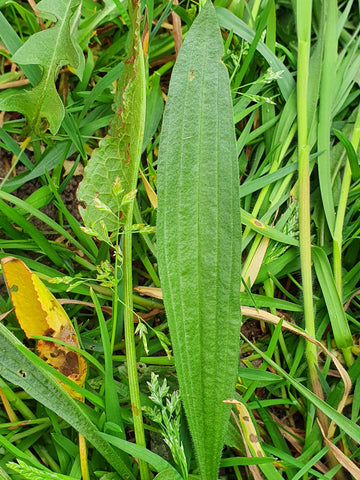
Narrow plantain (Plantago lanceolata)
Narrow plantain is a real horse plant that you can safely feed - but always in moderation. It is a very common wild plant of approximately 20 cm to 50 cm that can be found in practically every grass verge and is an asset to your horse pasture. You can recognize this plant by the lance-shaped leaves that grow in a rosette shape and form small white flowers around the spike.
Plantain is a natural antibiotic and a source of vitamins C and K, iron, zinc, calcium, copper and silicon and is also very medicinal.
You can offer this plant as support for the following complaints:
- Lungs and respiratory tract: dry cough, bronchitis, phlegm, infections, COPD, asthma and allergies.
- Wound healing: blood cleansing and blood-clotting and can be used as a dressing for scratches, cuts, bite wounds and open wounds.
- Skin, hair and hooves: sweet itch, laminitis, rough skin, wounds and scabs.
- Digestion: inflammation, intestinal and stomach ulcers.
- Urinary tract: positive influence on bladder and kidneys.

Great plantain (Plantago major)
See Narrow plantain.

White clover (Trifolium repens)
White and Red clover are a healthy addition to your horse's ration because they are rich in minerals (calcium, potassium, magnesium) and vitamins (A, B2, B3, C and E).
This plant has a cleansing effect and can be used as a gentle 'detox' and for respiratory complaints. A healthy snack for horses with sweet itch, mud fever, CPL, etc. but - as always - in moderation.

Red clover (Trifolium pratens)
See White clover.
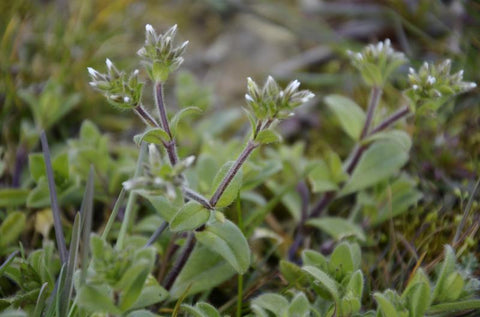
Tangle hornflower (Cerastium glomeratum)
Tangle horn flower is a very common species that decorates many meadows in the spring with its small white flowers. This plant is often confused with Chickweed (Stellaria media), but can be recognized by its dark stem.

Robert's wort (Geranium robertianum)
Robert's herb is completely hairy and can be recognized by its red stem. This medicinal plant has a sugar-regulating, antispasmodic and astringent effect, so it can be used for diarrhea and bleeding. Can be used for inflammation of the mouth and eyes.
Contains a lot of vitamin C, tannins, tannins, bitter substances and essential oil.
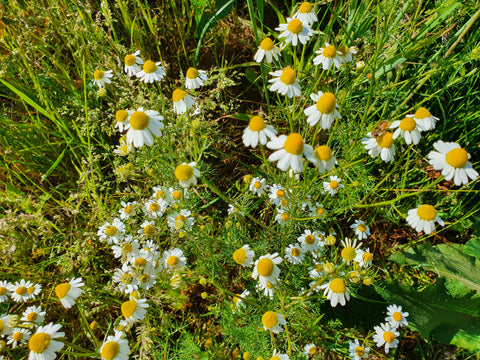
Real chamomile (Matricaria chamomilla)
Real chamomile has an anti-inflammatory and analgesic effect, and has a soothing effect on allergies and digestion.
Pick fresh throughout the year and offer as is.
Contains bitter substances, essential oils, mucilages, tannins, flavonoids, phosphorus, calcium, vitamins B and C and more.

Speedwell (Veronica)
The different types of Speedwell have blue-purple small flowers and have a blood-purifying effect. They are therefore a nice addition for horses that suffer from sweet itch, mud fever, CPL, etc. They also have a beneficial effect on the respiratory tract and the intestinal tract.
Speedwell contains tannic acid, bitter substances, saponins, essential oil, etc.

Thistle (Carduus)
Thistles come in all shapes and sizes. Due to their sharp spines, not all horses eat them, but many love them. You can offer the entire plant.
Thistles have an antibacterial and antioxidant effect.
Disclaimer: Caution and common sense are always advised. This article is not intended as medical advice. The author is not liable for misuse of plants or incorrect interpretation.
Discover our 100 % natural Zomereczeem lotion, Mok olie, CPL olie, Natuur Shampoo and OERVOER (E-book) about healthy nutrition for itch-sensitive horses HERE.
© Laura Cleirens - 2021.04.27
Last updated: 2023.12.28
